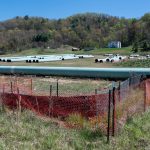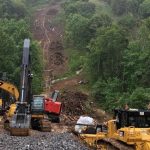
Conservation groups sued the U.S. Forest Service today for failing to protect streams in the Cherry River watershed from the harmful effects of coal hauling in the Monongahela National Forest.

Conservation groups sued the U.S. Forest Service today for failing to protect streams in the Cherry River watershed from the harmful effects of coal hauling in the Monongahela National Forest.

FOR IMMEDIATE RELEASE November 8, 2023 CONTACT Perrin de Jong, Center for Biological Diversity, (828) 595-1862, perrin@biologicaldiversity.org Dan Radmacher, Appalachian Voices, (540) 798-6683, dan@appvoices.org CHARLESTON, W.Va. — The Center for Biological Diversity and Appalachian Voices today sued the U.S. Office…

Today, the U.S. Court of Appeals for the 4th Circuit issued a stay of the biological opinion and incidental take statement under the Endangered Species Act for the Mountain Valley Pipeline.

Today, environmental organizations filed a petition for review in federal court challenging a recently issued new biological opinion and incidental take statement under the Endangered Species Act for the Mountain Valley Pipeline.

The Center for Biological Diversity and Appalachian Voices filed a formal notice today of their intent to sue the U.S. Office of Surface Mining Reclamation and Enforcement and the U.S. Fish and Wildlife Service for failure to protect the endangered Guyandotte River crayfish and the threatened Big Sandy crayfish from coal mining pollution. Both species are protected under the Endangered Species Act.

Today, for the third time, the U.S. Fish and Wildlife Service issued a Biological Opinion and Incidental Take Statement for the Mountain Valley Pipeline, one of several authorizations necessary under federal law to allow construction of the project.

In response to the U.S. Forest Service’s intention to break 11 of its own rules for the controversial Mountain Valley Pipeline, over 30,000 individuals and organizations submitted their opposition to the agency’s plan ahead of a February 21 deadline.

The agency had previously granted an extension request in 2020, but the total length of the certificate, nine years, reflects the ongoing roadblocks and volatility of the project. In the motion, the FERC acknowledged “the validity of our conclusions and environmental conditions cannot be sustained indefinitely.” Yet, their decision to grant a seemingly open-ended certificate renewal contradicts this statement.

CONTACT: Dan Radmacher, (540) 798-6683), dan@appvoices.org Today, the lead partner in Mountain Valley Pipeline announced that project developers would once more seek permits from the U.S. Forest Service and U.S. Fish and Wildlife Service rather than appealing the 4th U.S.…